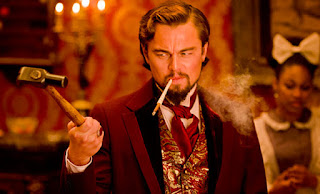An all-hell-breaks-loose Tarantinoesque Western
A Potpourri of Vestiges Review
Our Rating: 8.0
IMDb Ratings: 8.8
Genre: Action | Drama | Western
Cast: Jamie Foxx, Christoph Waltz, Leonardo DiCaprio
Country: USA
Language: English | German
Language: English | German
Runtime: 165 min
Color: Color
Summary: With the help of a German bounty hunter, a freed slave sets out to rescue his wife from a brutal Mississippi plantation owner.
Summary: With the help of a German bounty hunter, a freed slave sets out to rescue his wife from a brutal Mississippi plantation owner.
Django
Unchained is a 2012 Western film written and directed by American
filmmaker Quentin Tarantino. The movie stars Jamie Foxx, Christoph Waltz,
Leonardo DiCaprio, and Samuel L. Jackson in major roles. Django Unchained also features memorable cameos from Jonah Hill, Don Johnson, Quentin Tarantino and Franco Nero, who had played the titular role in the 1966 Spaghetti Western classic Django. Django Unchained is
Tarantino’s tribute to the visionaries of Western filmmaking—those who
conceptualized the decorated genre and more so those who prevented it from
dying by reinventing it. The Western genre has always fascinated Tarantino.
Right from the beginning of his career it has been his dream to make a Western
of his own. Sergio Leone and Sergio Corbucci are the two filmmakers who seem to
have inspired him the most. While Tarantino has never really expressed any
keenness to emulate Leone—perhaps thinking his works to be either too sacred or
too dull to be touched—he has never eschewed from showing his desire to
recreate the "Sergio Corbucci Universe" and to pay a homage to great
Italian visionary filmmaker. With Django Unchained, Tarantino finally seems to be living
his lifelong dream of emulating his childhood idol. And what makes Django
Unchained even more special is the fact that it comes at a time when the
Western genre once again finds itself on the brink of obsolescence.
 |
| Jamie Foxx as Django in Quentin Tarantino's Django Unchained |
 |
| Christoph Waltz as Dr. King Schultz in Django Unchained |
 |
| Kerry Washington as Broomhilda in Django Unchained |
 |
| Leonardo DiCaprio as Calvin Candie in Django Unchained |
 |
| Samuel L. Jackson as Stephen in Django Unchained |
 |
| Franco Nero (Right) makes a special appearance |
 |
| A Still from Quentin Tarantino's Django Unchained |
Readers, please feel free to share your opinion by leaving your comments. As always your feedback is highly appreciated!
People who liked this also liked...








dude, do not make your knowledges with Hollywood film , study slavery...
ReplyDeleteThanks... But. if you read the article closely you will notice that it strictly deals with the analysis of the movie and not with the issue of slavery in the first place!!! :-)
ReplyDeleteA good wholesome review! Btw, has the movie been released yet in India?
ReplyDeleteFantastic analysis. You are right, the movie is not as great as Inglorious Basterds or Pulp Fiction, but it is really a well accomplished effort and an entertaining one too.
ReplyDeleteBTW, have you watched Corbucci's "The Great Silence"?
Remove content | Delete | Spam
I am glad you like it... the movie is indeed a well accomplished effort. What made Pulp so special was the fact that it was the first of a kind... it even helped it to win the coveted Palme d'Or.
ReplyDeleteYes, I have watched both of Corbucci's classics, The Great Silence as well as Django... what made the former more special, in my opinion, was its great ending and the presence of Klaus Kinski as its antagonist.
Hey Great review:).Yet to watch this one:).
ReplyDeleteThanks Akshay... I am glad you liked it :-)
ReplyDeleteWhoa... I am confused if this a Wikipedia entry or a blog post? Lol. Super comprehensive dude. Keep'em coming :-)
ReplyDeleteThanks Jayanth... I am glad that you liked it. I thought that the movie deserved a long and comprehensive review... just couldn't stop writing once I got started with it!!! :-)
ReplyDeleteWhen you have the time ..
ReplyDeletehttp://jayanthj.blogspot.in/2013/01/django-unchained-2012-movie-review.html
Thanks for this intelligent review. But Schultz as conscience of white men? How about pragmatist who knows that keeping slaves as a lifestyle is more expensive than paying free men lower wages... This isn't conscience, this is arithmetic.
ReplyDeleteThanks for throwing in your perspective. I would have totally agreed with what you just said had it not been for the extra mile that Schultz traveled to help Django save his wife. But, you are write to a great extent... one just can't deny the fact that Schultz was a pragmatist... an astute businessman who knew well how to weigh his options. But, there was a human side to it too and that's what I have tried emphasizing upon in my review.
ReplyDeleteGood review. I think I would give it a 7.8. It's as entertaining and funny as expected, but just not as strong as QT's previous effort, and Foxx was not a powerful enough lead.
ReplyDeleteThanks Bonjour! I think 7.8 would be quite fair... I agree with you about Foxx for I too believe that he was not as good as the others. Django may not be his best work but being a Western I think it's a worthy addition to his oeuvre.
ReplyDeleteThanks Aakanksha... I am really glad that you liked it!!! I think it's slotted for a March release.
ReplyDeleteA well articulated take. And that exactly is what an(y) art form yearns to elicit from a critique.
ReplyDeleteMy take(http://connoisseurofmovies.blogspot.in/2013/02/djangochainstarantino.html/) is that Django is too long, and QT did not do well by killing off the dentists & the candyman so damn early.
All said & done, QT is well QT. :P
I am glad you liked it. And as far as the opinion on the movie is concerned, to each his own!!! :-)
ReplyDelete